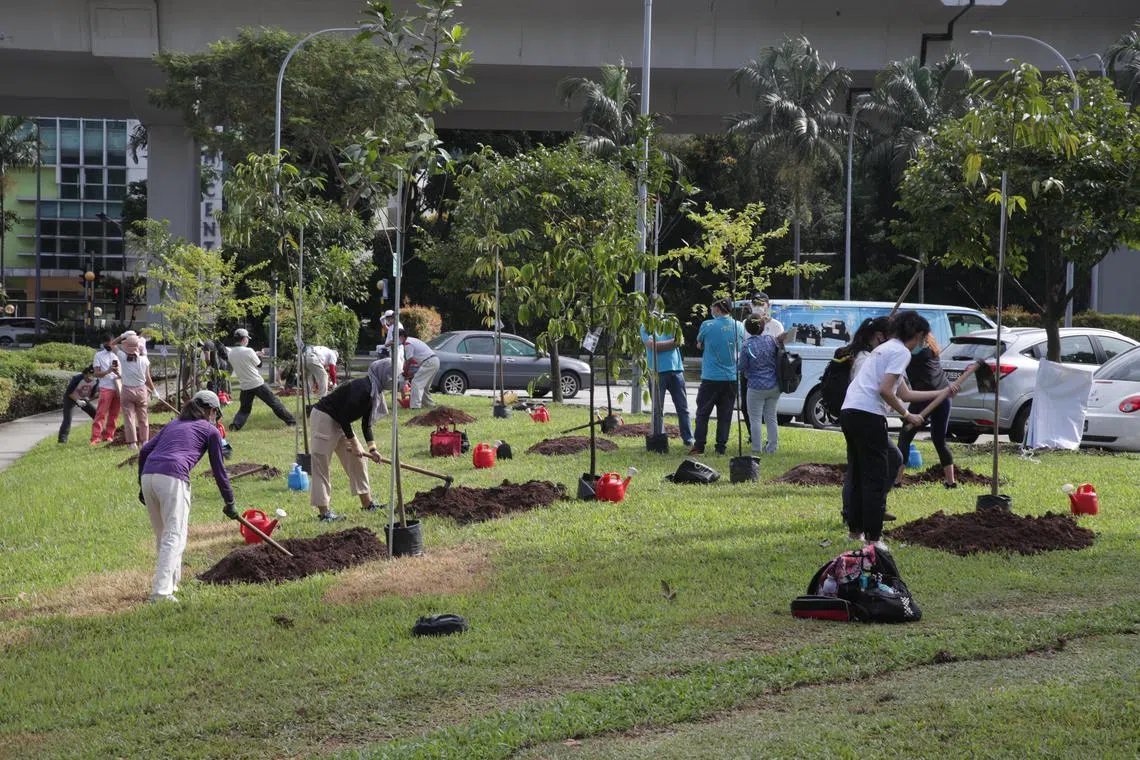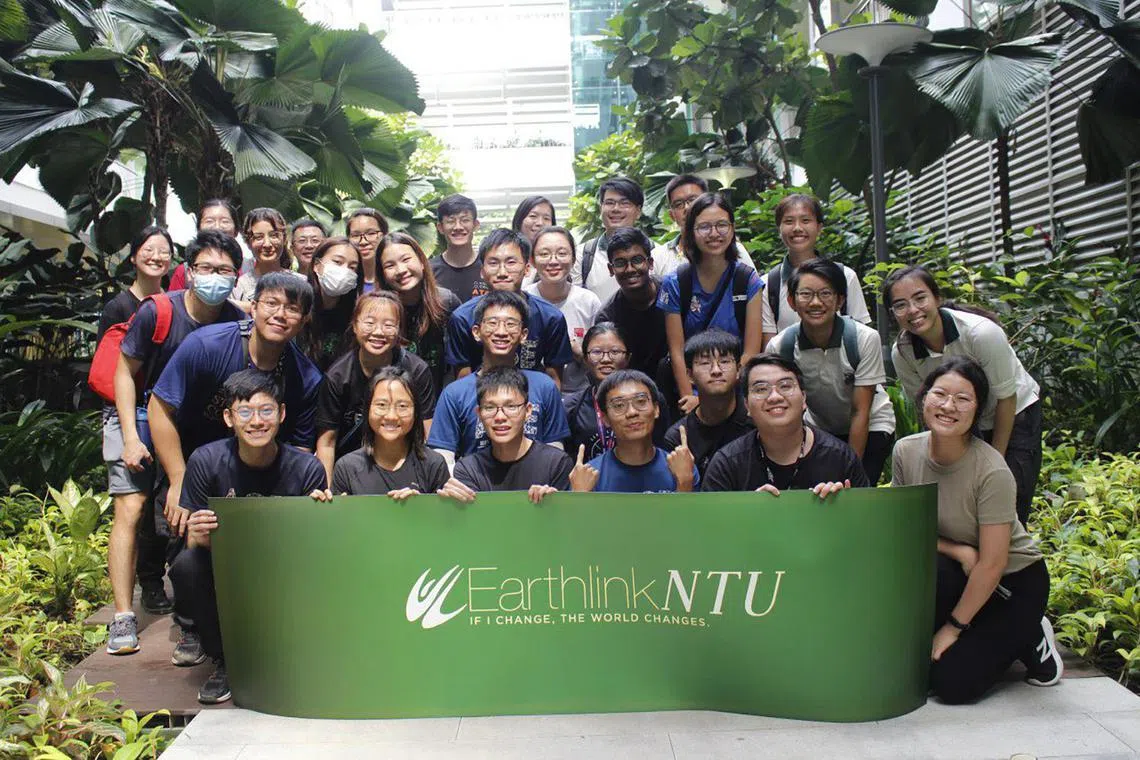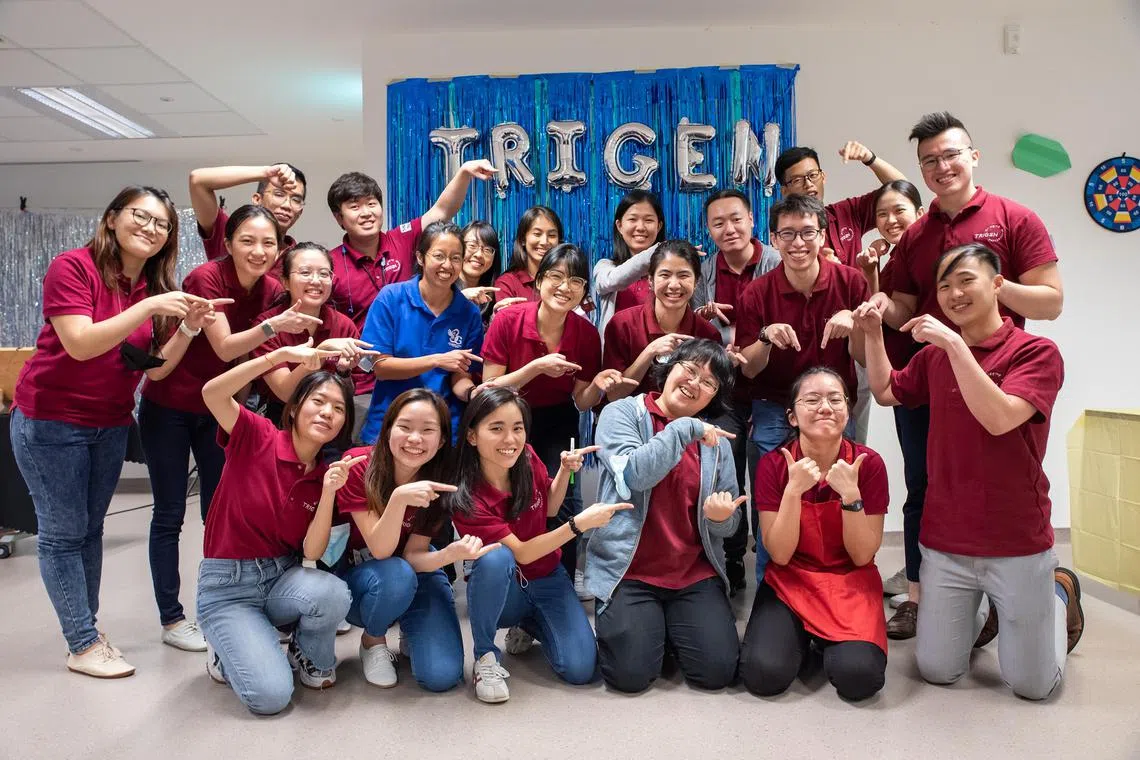People want to do good, driven by desire for positive impact on society
This is the last of a series of 12 primers on current affairs and issues in the news, and what they mean for Singapore.
Sign up now: Get ST's newsletters delivered to your inbox

While the impulse to do good is universal, the concept of altruism has evolved over the years.
PHOTO: ST FILE
SINGAPORE - In Taiwan, a shiba inu cartoon mascot, by way of a snappy rhyming slogan, implores young people passing through the popular Zhongxiao Dunhua underground shopping street to donate blood.
In contrast, Singapore exhorts people to donate blood through thought-provoking ads – “60 minutes of your time can save three lives” – or positive profiles of donors.
While the ways differ to persuade people to do good, it appears that the willingness to comply transcends borders and time.
Especially in times of crisis, people are driven to help their fellow men.
During the Covid-19 pandemic, for instance, there was an outpouring of kindness to help those in need,
Some of these sentiments to do good, and the structures set up to facilitate these actions, have remained, though most people have gone back to focusing on their own needs, said experts.
And while the impulse is universal, the concept of altruism has evolved over the years. This can be seen in how people are encouraged to do good for others, and in the causes that they contribute to.
What is altruism and how has it evolved?
French sociologist August Comte coined the term altruism in the early 1850s, from the Latin “alteri”, or other.
He believed that individuals had a moral obligation to renounce self-interest and live for others, and that it was necessary to the benefit and progress of society.
The concept of altruism and doing good has persisted over centuries.
People help one another in a wide variety of ways, from supporting friends in need to stopping to help the victims of a road accident.
Professor Ang Hak Seng, director of the Centre of Excellence for Social Good at the Singapore University of Social Sciences (SUSS), noted that over the decades, there has been an increase in volunteering and donation rates in Singapore.
While the numbers dipped amid the Covid-19 pandemic, the overall trajectory is likely to be positive, said Prof Ang.
In this age of doing good, individuals want to give back to society in a more constructive manner whereby they can utilise their expertise, he added.
They also prefer to contribute to a meaningful cause that aligns with their personal values,
Associate Professor Adrian Kwek from SUSS noted that the concept of “effective altruism” has been influential among the philanthropic community.
The idea is that people should make rational calculations in order to maximise the usefulness of the money they donate, or resources they offer.
“This brings with it changes to what makes a charity credible. Instead of a charity’s longstanding reputation or the famous people associated with it, an important metric that motivates people to support a charity is its effectiveness,” said Prof Kwek from the College of Interdisciplinary and Experiential Learning at SUSS.
How are people motivated to do good?
Prof Ang noted that the pandemic strengthened two structures – targeted volunteerism and the use of digital platforms – that are expected to persist.
Targeted volunteerism includes food delivery, mask distributions and public education on vaccinations.
“This type of volunteerism is likely to persist due to the relationships and trust that were built during the volunteering process. For example, we have seen an increase in targeted volunteers looking to address the current high cost of living (through) food rescue,” said Prof Ang.
Digital platforms are also here to stay, such as SG Cares’ volunteer.gov.sg Giving.sg.
These allow for a larger pool of volunteers and donors to be tapped and also make it easier for people to participate, he noted.
In terms of sentiment, National University of Singapore sociologist Tan Ern Ser noted that in a crisis such as a pandemic, there tends to be a shift from a focus on self-reliance to social solidarity.
Post-pandemic, this wanes somewhat as people return to how they lived before, focusing on their own needs and those of their families, he said.
Still, they remain generally willing to help others when they see an urgent need arise that they can empathise with, he noted.
But if the need seems fairly remote from their everyday lives, it would take more to nudge them into believing they can or should help, said Associate Professor Tan.
Climate change is one example of a cause that can seem far beyond individual responsibility, he said. To spur people to act, it has to be distilled into issues that they can grapple with, such as single-use plastics and food waste.
The more remote the cause, the easier it is to ignore it or look away, he added.
Dr William Wan, general secretary of the Singapore Kindness Movement, noted that over time, the ways to motivate people to do good have evolved.
In the past, external incentives such as rewards or recognition were common, he said.
However, research has shown that intrinsic motivations, like the feeling of fulfilment from helping others, play a more significant role in sustaining altruistic behaviour.
Prof Kwek said the usual ways that people can be motivated to do good include bringing opportunities to people – such as through charity or blood donation drives – religious inculcation, national education and informal role modelling.
These methods have become more sophisticated with research into behaviour and how people make decisions. Tactics now tap human psychological tendencies through configuring the context in which people choose, to sway them in a certain direction.
Examples include addressing people by name when asking for donations, recounting vividly the lives of individuals in need rather than offering cold facts, or showing photographs of babies and children.
What are young people interested in and why?
In the 1970s, the American political scientist Ronald Inglehart found a positive correlation between material security and a rise in values such as a sense of community, social solidarity, volunteerism and altruism.
He found that the post-war generations in the West were able to take material security for granted and began to place greater importance on non-material goals such as self-expression, autonomy, freedom of speech, gender equality and environmentalism.
By definition, young people in Singapore today would be similarly post-materialistic, said Prof Tan.
They are interested in causes related to the environment, democracy, human rights, social inclusion and diversity.
Citing Maslow’s hierarchy of needs, Ms Syimah Jasni, 25, noted that this generation of youth largely has its basic needs for food, money, family and social relationships met.
Now, many are thinking about higher-order needs such as attaining self-actualisation and finding purpose in life, said Ms Syimah, a mental health advocate.
She has volunteered with Project It’ll Be Alright under the Youth Mental Well-Being Network, among others, and currently volunteers with the People’s Association Malay Activity Executive Committee, which promotes harmonious relations between Malays and other communities.
Ms Syimah, who works in technology sales, said her motivation to do good comes from internal satisfaction, which “cannot be found with money, but from matters of the heart”.
She said that she did not want to live in a “privileged bubble”, having been blessed with the benefits of the meritocratic system here.
“I want to share information and knowledge with those with not as much opportunity. Not sharing builds up guilt in me,” she said.
Prof Ang said youth today are attracted to cause-based volunteerism, in particular in areas such as the environment and sustainability.
They are also drawn to needs-based volunteerism, such as mental health and eldercare.
Young people are generally motivated by three criteria, said Prof Ang.
First, the opportunities have to be fun while anchored in purpose.
Second, these opportunities have to be co-created with the youth, so they feel a sense of ownership in their efforts.
Third, there should be opportunities for personal development, such as the ability to gain life skills like leadership and management.
Dr Wan from the Singapore Kindness Movement said the younger generation has shown a growing interest in positively impacting society, in causes related to social justice, environmental sustainability and mental health.
He attributed this generational trend to improved access to education, exposure to diverse perspectives through the Internet, and a shift towards valuing experiences and fulfilment over material possessions.
Youth are driven by a desire to create positive change and leave a lasting impact on society, and seek a deeper sense of purpose and meaning in their lives, said Dr Wan.
The rate of volunteering among those aged 15 to 24 in the 2018 Individual Giving Survey was 40 per cent, higher than the national average of 29 per cent.
Mr Tan Shi Zhou, 25, a recent Nanyang Technological University graduate, said his interest in environmental issues arose after he attended a movie screening on the human impact on wildlife as a polytechnic student.
“If we can’t sustain the very planet we live in, any other causes won’t be able to sustain themselves either. That was the biggest factor that pushed me to be more active in the sustainability space,” he said.

Mr Tan Shi Zhou (first row, second from right) with fellow members of Earthlink at NTU, an environmental sustainability club he headed from 2020 to 2022.
PHOTO: COURTESY OF TAN SHI ZHOU
He joined an environmental group in school, and later volunteered with local non-governmental organisations and groups. He currently volunteers with the Asian Environmental Youth Network and will be joining the board, also in a voluntary position, of global organisation Youth4Nature.
Mr Tan said he has noticed that volunteers are getting younger, often starting to help while still in secondary school or junior college.
“The youth of today are more aware of the different issues due to social media and online accessibility. It plays a big role in the decisions that they make, including their job search,” said Mr Tan, who works as a regional sustainability executive at a supply-chain logistics company.
Dr Angeline Tey, 31, co-founder of the Tri-Generational Homecare (TriGen) initiative, said she wanted to pass on to others the benefits of having a community that she had experienced herself.
She and co-founder Kennedy Ng started TriGen in their third year of medical school in 2014, hoping to help a group of patients who needed both medical and social support in ways that included reading mail for seniors who lived alone so they knew when their appointments were.

Dr Angeline Tey (in blue jacket) and Dr Kennedy Ng (first row, extreme right) are co-founders of TriGen, an initiative to provide patients with social support while giving youth a platform to do good.
PHOTO: COURTESY OF ANGELINE TEY
TriGen is so named because it aims to bring three generations together: youth, young adults – including doctors, nurses, physiotherapists and social workers – and elderly patients recently discharged from hospitals.
Dr Tey, a respiratory and critical care physician, acknowledged that running TriGen does come at a certain cost, since she and the other volunteers have full-time jobs.
“But what motivates me, despite the limited time we have, is the question, if there is no one else, if I don’t do it, then who will be doing it?” she said.
As a younger person when she started TriGen, the drive to do good came from wanting to help people, as well as trying to figure out her own identity and role in society.
“In my current age group, that is when we see ourselves as having identified a role that we belong to, and are trying to see how our families and society can move forward. More outward-looking, less inward-looking,” she said.
For 12 Mondays between March 20 and Aug 7, this paper’s journalists have been addressing burning questions and offering Singaporean perspectives on complex issues in the Opinion section.
The primer articles are part of The Straits Times-Ministry of Education News Outreach Programme, which aims to promote an understanding of local and global issues among pre-university students.
The primers broach contemporary topics, such as climate change and medical technology. Each primer topic gives a local perspective to help students draw links to the issues’ implications for Singaporeans.
This programme is jointly organised by The Straits Times and the Ministry of Education.



